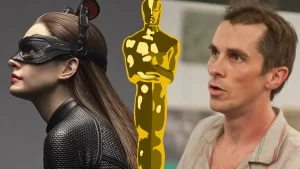When the “Chick Flick” Induces Suicidal Depression
A Film Review of Bridesmaids
By: Lawrence Napoli
 “What is this movie review doing on this website?” one may be asking. I gather such a shocking development may frighten and disturb the fine web browsers of cosmicbooknews.com. To which I respond that I am, in fact, a man who is simply interested in expanding our horizons a bit for two specific reasons in regards to Bridesmaids: 1) it has been described as “female version” of The Hangover and 2) it did quite well in the box office in the middle of the biggest blockbuster summer of all time where “chick flicks” do not traditionally produce a blip on the radar. For the amount of buzz this film generated, I felt compelled to give it a shot and see if the popularity was justified. I’ve always been of the school of thought that all human beings regardless of creed, color, gender and age are indeed equal in our sharing of the most basic of human needs and desires. But then a film like Bridesmaids comes along which completely reaffirms the concept of Men Are From Mars, Women Are From Venus. Let’s just say it took every fiber in my being to resist walking out on this display of filmmaking that I had to return home immediately and filter the bitter taste from my soul with a mini Chris Nolan film festival with back-to-back-to-back screenings of Inception, The Dark Knight and The Prestige.
“What is this movie review doing on this website?” one may be asking. I gather such a shocking development may frighten and disturb the fine web browsers of cosmicbooknews.com. To which I respond that I am, in fact, a man who is simply interested in expanding our horizons a bit for two specific reasons in regards to Bridesmaids: 1) it has been described as “female version” of The Hangover and 2) it did quite well in the box office in the middle of the biggest blockbuster summer of all time where “chick flicks” do not traditionally produce a blip on the radar. For the amount of buzz this film generated, I felt compelled to give it a shot and see if the popularity was justified. I’ve always been of the school of thought that all human beings regardless of creed, color, gender and age are indeed equal in our sharing of the most basic of human needs and desires. But then a film like Bridesmaids comes along which completely reaffirms the concept of Men Are From Mars, Women Are From Venus. Let’s just say it took every fiber in my being to resist walking out on this display of filmmaking that I had to return home immediately and filter the bitter taste from my soul with a mini Chris Nolan film festival with back-to-back-to-back screenings of Inception, The Dark Knight and The Prestige.
I normally do not place “chick flicks” like romantic dramas and romantic comedies at the top of my film viewing priorities, but I consider them to be as important to the overall art form of filmmaking as any other genre. My favorite film of all time, Casablanca (1942), happens to be a romantic drama at the very heart of its plot and my favorite romantic comedy happens to be Serendipity (2001) that features a transcendent synergy between Kate Beckinsale and John Cusack [and makes my cry like a little girl at the end every time – even if it’s being replayed on TBS]. I have a strong appreciation for films that attempt to stray from the stereotypical “male gaze” because a woman’s outlook on life is equally creative and fascinating. I found the article by Martha Brockenbrough, “In Defense of Chick Flicks” to be quite helpful in identifying a feminine perspective on this genre of filmmaking, but was saddened when I could no longer find it posted on msn.com.
The script for Bridesmaids was written by the lead actress Kristen Wiig in conjunction with Annie Mumolo. This feature film is only the second writing credit either woman has received for anything in the entertainment industry, ergo, novice writer alert! The inspiration for this story was to blend the raunchy presentation of The Hangover, slap a pair of tits on it and frame the action amidst one of the most hallowed (and female controlled) aspects of life: the wedding. Although this concept seems interesting and potentially hilarious, its execution onscreen was quite un-funny (even more crickets in the theater than The Other Guys) and a tad insulting in its blunt depiction of women as stereotypically territorial, petty and mere playthings of their male counterparts. Perhaps this is where my “male” perspective may be labeled as “uninformed” by feminists, but the engine for all the comedy was less about laughs and more about making the audience feel terrible for the unrelenting misfortune visited upon the main character, Annie. At first, some of the conflict generated by Annie’s mishandling of her Maid of Honor duties is quite amusing. But the negative momentum for the character never desists until the very end of the film. It is at this point where the movie’s true plot format reveals itself as less “Hangover-raunchiness” and more like What About Bob? (1991).
I don’t particularly care for a plot that constantly “dumps on” the main character because the writer runs the risk of losing all sympathy for the one perspective the entire audience is meant to identify with. What kept a film like What About Bob? From falling into that trap was that Richard Dreyfus’ character fought back against Bill Murray’s tomfoolery throughout which kept the laughs at a steady rate. Plot pace is so frequently decelerated in Bridesmaids by Kristen Wiig’s self-pitying/self-loathing that the writers felt the need to add a scene where another bridesmaid visits the main character to literally slap her around to force Annie to fight back against anything for the first time in the entire film. This leaves about 20 minutes in the film for the protagonist to redeem herself when the first 100 minutes firmly established her as a woman completely void of self esteem with a penchant of bending over and “taking it” regardless of the situation life presents her. All the pranks, disasters and bad luck simply stopped being funny to the point where pity transformed into disgust. The story of Bridesmaids kicks you in the groin, punches you in the face and then asks you to laugh about it. I guess some people are into that.
Kristen Wiig produces the perfect performance of a woman that simply redefines the concept of “pathetic” in every conceivable application in life and unfortunately, that’s kind of the problem. She really does it all too well which creates a main character that has few redeeming qualities to begin with and as the story develops, has even less. That’s not to say that this kind of performance has no value because she portrays very realistic behavior of how less empowered individuals deal with adversity. The real problem is that this kind of performance belongs in a drama because good comedies require some element of positive energy to thrive. Wiig’s constant pouty demeanor and blank expression completely diminish any conceived positive rebound in the story as they are a direct result of the limitation of the text generated by her own hand. Perhaps this passes off as “funny” on Venus?
Megan played by Melissa McCarthy (yes, a relative of Jenny McCarthy) was designed to be an exact copy of Zach Galifianakis’ Alan character and although she doesn’t come close to delivering the same level of absurd hilarity as her male counterpart, her performance was quite welcome and refreshing to see a woman completely comfortable in her own skin despite the fact she isn’t a size 2. Of course, this means McCarthy is the focal point of the gross-out and shock-comedy of this film, but it also produces some of the few and genuinely funny scenes throughout. To a very large extent, her performance works because most have witnessed it before in both Hangover films, but McCarthy’s rendition is slightly tempered to match the tone of a story that tries to channel a “female gaze.” The rest of the bridesmaids and the bride herself played by Maya Rudolph don’t have many comedic opportunities to shine because too much screen time was reserved for Kristen Wiig’s depression.
And speaking of depression, this film made me feel like pulling a Columbine over how bad life could get for an individual and top it off with a suicide by cop. I sincerely could not wrap my head around the perceived “laughs” that were meant to be generated by hammering the protagonist into an emotional bloody pulp. The main character’s gender is almost irrelevant as Annie’s attitudes towards herself, men and other women are quite indicative of stereotypical misogyny which I interpreted as quite disempowering and somewhat offensive to women. Bridesmaids is definitely NOT one of those “chick flicks” which Martha Brockenbrough describes as being a “cathartic experience.” It is neither inventive, nor meaningful, nor magical. That is, unless one’s particular brand of catharsis involves a healthy diet of hollow tipped lead projected at high velocities through one’s mouth.







